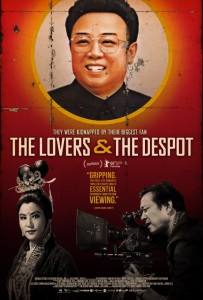 Millions of people probably wish of getting a pile of money to make movies, and on the surface that sounds like a pretty good dream. But when that money comes from an insane dictator who kidnaps you and demands you make movies that will promote his twisted ideology… well, it doesn’t sound so wonderful anymore. Sadly, that’s exactly the fate that was faced by the subjects of The Lovers and the Despot, a documentary directed by Ross Adam and Robert Cannan.
Millions of people probably wish of getting a pile of money to make movies, and on the surface that sounds like a pretty good dream. But when that money comes from an insane dictator who kidnaps you and demands you make movies that will promote his twisted ideology… well, it doesn’t sound so wonderful anymore. Sadly, that’s exactly the fate that was faced by the subjects of The Lovers and the Despot, a documentary directed by Ross Adam and Robert Cannan.
As most people have learned about North Korea from movies like Team America: World Police and The Interview, North Korea – and in particular, former dictator Kim Jong-il – takes movies very seriously. Being that the country is one of the most controlled nations in modern history, film is a very important piece of the regime’s propaganda machine. However, because of North Korea’s seclusion and its lack of filmmaking resources, North Korea’s films were largely poorly-made, forgettable fare. Kim, who wanted to prove the superiority of his regime, desired to create better films that could achieve international recognition. Since Kim couldn’t find anyone in North Korea talented enough to make his movie dreams a reality, he decided to bring the talent to Pyongyang instead.
That would be Shin Sang-ok and Choi Eun-hee. Shin was an award-winning South Korean filmmaker and Choi was an acclaimed actress who was once married to Shin and the star of many of his films. In 1978, Choi went to Hong Kong to meet about a film role, but was instead kidnapped and brought to North Korea. When Shin went to Hong Kong to assist in the search, he was also kidnapped. After a period of imprisonment, Shin was asked by Kim to take over North Korea’s film industry. What followed was an intense period of working around the clock for Shin and Choi to create movies that Kim could be proud of.
Surprisingly, the documentary glosses over Pulgasari, the most noteworthy film created by Shin during his period in North Korea since it’s essentially the North Korean version of Godzilla (our review of this insane gem). Only a brief clip is shown of this infamous film. In fact, almost nothing is revealed about the films Shin and Choi made in North Korea except for the fact that they obviously promoted the ideals of the totalitarian regime. While the circumstances of Shin and Choi’s capture and eventual release are fascinating, detailing their creative work under such strict conditions would’ve been equally fascinating.
One aspect in which the film treats its subjects with kid gloves is the widespread – but unconfirmed – belief that while Choi was kidnapped, Shin may have defected willingly. The documentary disputes this and uses the secretly-recorded tapes with Kim as evidence, but it would’ve been interesting to see the other evidence.
Adam and Cannan use clips from films directed by Shin to illustrate the actual events of Shin and Choi’s lives. It’s an interesting choice, but it doesn’t reveal much about the films themselves. Considering most people viewing The Lovers and the Despot have never seen any of Shin or Choi’s work (especially the films they made in North Korea), it would’ve been helpful for Adam and Cannan to delve more into what made Shin and Choi such big “gets” for Kim by detailing their past work.
Interviews with Choi and several others involved provide the political context, but not the creative context. Because of that, it feels as if we’re only getting only part of the intriguing story in The Lovers and the Despot.

















Recent Comments